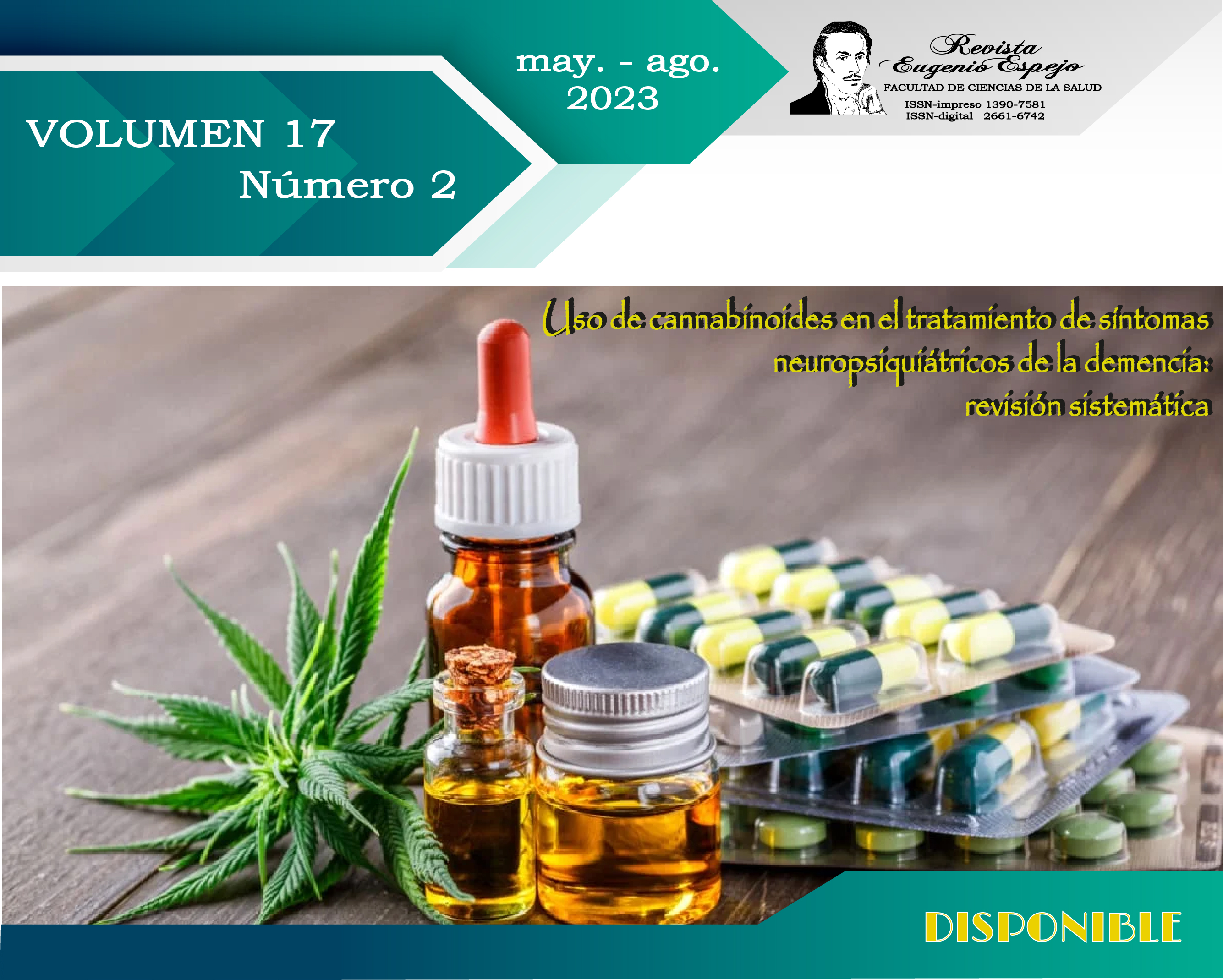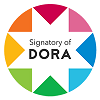Cannabinoids use´s in treatment of neuropsychiatric symptoms of dementia: Systematic review
DOI:
https://doi.org/10.37135/ee.04.17.10Keywords:
Dementia, Cannabinoids, Medical MarijuanaAbstract
Dementia is a progressive neurodegenerative disorder that produces associated neuropsychiatric symptoms (NTS). A systematic review of clinical trials published in PubMed and Web of Science between 1996 and 2022 was conducted using the PRISMA methodology. Seven articles met the established requirements at the end of the screening process. The results of five reviewed studies confirmed a reduction in NTS. No serious adverse events were reported in any of the studies, with only mild and moderate ones. The analyzed results did not allow for establishing significant differences in favor of cannabinoids. It was impossible to identify a standardization of the dose of cannabinoids in the treatment of NTS. In the other hand, a reduction in the neuropsychiatric scales was observed when using nabilone doses of 1-2 mg/day.
Downloads
References
Paunescu H, Dima L, Ghita I, Coman L, Ifteni PI, Fulga I, et al. A Systematic Review of Clinical Studies on the Effect of Psychoactive Cannabinoids in Psychiatric Conditions in Alzheimer Dementia. Am J Ther [Internet]. 2020 [citado 14 May 2022]; 27(3): e249–e269. Disponible en: https://journals.lww.com/americantherapeutics/Abstract/2020/06000/A_Systematic_Review_of_Clinical_Studies_on_the.4.aspx. http://dx.doi.org/10.1097/MJT.0000000000001120.
Sherman C, Ruthirakuhan M, Vieira D, Lanctôt KL, Herrmann N. Cannabinoids for the treatment of neuropsychiatric symptoms, pain and weight loss in dementia. Curr Opin Psychiatry [Internet]. 2018 [citado 14 May 2022]; 31(2): 140–146. Disponible en: https://pubmed.ncbi.nlm.nih.gov/29256923/#:~:text=Summary%3A%20Findings%20from%20trials%20with,management%20in%20patients%20with%20dementia. http://dx.doi.org/10.1097/YCO.0000000000000399.
Bosnjak-Kuharic D, Markovic D, Brkovic T, Jeric-Kegalj M, Rubic Z, Vuica-Vukasovic A, et al. Cannabinoids for the treatment of dementia. Cochrane Database Syst Review [Internet]. 2021 [citado 14 May 2022]; (9). Disponible en: https://www.cochranelibrary.com/cdsr/doi/10.1002/14651858.CD012820.pub2/full. http://dx.doi.org/10.1002/14651858.CD012820.pub2.
Outen JD, Burhanullah MH, Vandrey R, Amjad H, Harper DG, Patrick RE, et al. Cannabinoids for Agitation in Alzheimer’s Disease. Am J Geriatr Psychiatry [Internet]. 2021 [citado 15 May 2022]; 29(12): 1253–1263. Disponible en: https://linkinghub.elsevier.com/retrieve/pii/S1064748121000300. https://doi.org/10.1016/j.jagp.2021.01.015.
Lyketsos CG, Lopez O, Jones B, Fitzpatrick AL, Breitner J, Dekosky S. Prevalence of neuropsychiatric symptoms in dementia and mild cognitive impairment: Results from the cardiovascular health study. JAMA [Internet]. 2002 [citado 15 May 2022]; 288(12): 1475–1483. Disponible en: https://jamanetwork.com/journals/jama/fullarticle/195320. http://dx.doi.org/10.1001/jama.288.12.1475.
Sánchez M, Rodríguez T, Pérez E, Gay F. Síntomas neuropsiquiátricos en personas con demencia relacionados con el confinamiento por la pandemia de la COVID-19. Revisión sistemática exploratoria. Rev Neurol [Internet]. 2022 [citado 15 May 2022]; 74(3): 83–92. Disponible en: https://neurologia.com/articulo/2021356#:~:text=Los%20s%C3%ADntomas%20neuropsiqui%C3%A1tricos%20que%20m%C3%A1s,la%20depresi%C3%B3n%20y%20la%20apat%C3%ADa.
Brodaty H, Connors MH, Xu J, Woodward M, Ames D. The course of neuropsychiatric symptoms in Dementia: A 3-year longitudinal study. J Am Med Dir Assoc [Internet]. 2015 [citado 15 May 2022]; 16(5): 380–387. Disponible en: https://linkinghub.elsevier.com/retrieve/pii/S1525861014008433. http://dx.doi.org/10.1016/j.jamda.2014.12.018.
Demencia [Internet]. World Health Organization; 2021 [citado 16 May 2022]. Disponible en: https://www.who.int/news-room/fact-sheets/detail/dementia#:~:text=Ratesofdementia,and 139 million in 2050.
Buitrago F, Morales Gabardino JA. Demencia. FMC Aten Primaria [Internet]. 2011 [citado 16 May 2022]; 18(10): 646–647. Disponible en: http://www.fmc.es/es-demencia-articulo-X1134207211596611.
Assessing the socioeconomic impact of Alzheimer’s disease in Western Europe and Canada [Internet]. London: The Economist Intelligence Unit.; 2017 [citado 16 May 2022]. Disponible en: https://eiuperspectives.economist.com/sites/default/files/AssessingthesocioeconomicimpactofAlzheimer’sinwesternEuropeandCanada.pdf.
Martín-Carrasco M, Bulbena-Vilarrasa A. Diagnóstico precoz de la enfermedad de Alzheimer. Psiquiatr Biológica [Internet]. 2003 [citado 28 May 2022]; 10(4): 119–132. Disponible en: http://www.elsevier.es/es-revista-psiquiatria-biologica-46-articulo-diagnostico-precoz-enfermedad-alzheimer-13053498.
Musa G, Henríquez F, Muñoz-Neira C, Delgado C, Lillo P, Slachevsky A. Utility of the neuropsychiatric inventory questionnaire (NPI-Q) in the assessment of a sample of patients with Alzheimer’s disease in Chile. Dement e Neuropsychol [Internet]. 2017 [citado 28 May 2022]; 11(2): 129–136. Disponible en: https://www.scielo.br/j/dn/a/SKr8JNxqGZy4VZXTzGqmdKw/?lang=en. http://dx.doi.org/10.1590/1980-57642016dn11-020005.
Griffiths AW, Albertyn CP, Burnley NL, Creese B, Walwyn R, Holloway I, et al. Validation of the Cohen-Mansfield Agitation Inventory Observational (CMAI-O) tool. Int Psychogeriatrics [Internet]. 2020 [citado 28 May 2022]; 32(1): 75–85. Disponible en: https://www.cambridge.org/core/journals/international-psychogeriatrics/article/validation-of-the-cohenmansfield-agitation-inventory-observational-cmaio-tool/750293F0CA21221035931C34C1747A66. http://dx.doi.org/10.1017/S1041610219000279.
Perng CH, Chang YC, Tzang RF. The treatment of cognitive dysfunction in dementia: a multiple treatments meta-analysis. Psychopharmacology (Berl) [Internet]. 2018 [citado 28 May 2022]; 235(5): 1571–1580. Disponible en: https://link.springer.com/article/10.1007/s00213-018-4867-y. http://dx.doi.org/10.1007/s00213-018-4867-y.
Porsteinsson AP, Drye LT, Pollock BG, Devanand DP, Frangakis C, Ismail Z, et al. Effect of citalopram on agitation in Alzheimer disease: The CitAD randomized clinical trial. JAMA [Internet]. 2014 [citado 29 May 2022]; 311(7): 682–691. Disponible en: https://jamanetwork.com/journals/jama/fullarticle/1829989. http://dx.doi.org/10.1001/jama.2014.93.
Rosenberg PB, Lanctôt KL, Drye LT, Herrmann N, Scherer RW, Bachman DL, et al. Safety and efficacy of methylphenidate for apathy in Alzheimer’s Disease: A randomized, placebo-controlled trial. J Clin Psychiatry [Internet]. 2013 [citado 29 May 2022]; 74(8): 810–816. Disponible en: https://www.psychiatrist.com/jcp/neurologic/dementia/safety-efficacy-methylphenidate-apathy-alzheimers/. http://dx.doi.org/10.4088/JCP.12m08099.
Sultzer DL, Davis SM, Tariot PN, Dagerman KS, Lebowitz BD, Lyketsos CG, et al. Clinical symptom responses to atypical antipsychotic medications in Alzheimer’s disease: Phase 1 outcomes from the CATIE-AD effectiveness trial. Am J Psychiatry [Internet]. 2008 [citado 29 May 2022]; 165(7): 844–854. Disponible en: https://ajp.psychiatryonline.org/doi/full/10.1176/appi.ajp.2008.07111779. http://dx.doi.org/10.1176/appi.ajp.2008.07111779.
Watt JA, Goodarzi Z, Veroniki AA, Nincic V, Khan PA, Ghassemi M, et al. Comparative efficacy of interventions for reducing symptoms of depression in people with dementia: Systematic review and network meta-analysis. BMJ [Internet]. 2021 [citado 25 May 2022]; 372(532). Disponible en: https://www.bmj.com/content/372/bmj.n532. https://doi.org/10.1136/bmj.n532.
Charernboon T, Lerthattasilp T, Supasitthumrong T. Effectiveness of Cannabinoids for Treatment of Dementia: A Systematic Review of Randomized Controlled Trials. Clin Gerontol [Internet]. 2021 [citado 23 May 2022]; 44(1):16–24. Disponible en: https://www.tandfonline.com/doi/full/10.1080/07317115.2020.1742832. http://dx.doi.org/10.1080/07317115.2020.1742832.
Aso E, Ferrer I. Cannabinoids for treatment of alzheimer’s disease: Moving toward the clinic. Front Pharmacol [Internet]. 2014 [citado 23 May 2022]; 5. Disponible en: https://www.frontiersin.org/articles/10.3389/fphar.2014.00037/full. http://dx.doi.org/10.3389/fphar.2014.00037.
Aso E, Juvés S, Maldonado R, Ferrer I. CB2 cannabinoid receptor agonist ameliorates alzheimer-like phenotype in AβPP/PS1 mice. J Alzheimer’s Dis [Internet]. 2013 [citado 30 May 2022]; 35(4): 847–858. Disponible en: https://content.iospress.com/articles/journal-of-alzheimers-disease/jad130137. http://dx.doi.org/10.3233/JAD-130137.
Koppel BS, Brust JCM, Fife T, Bronstein J, Youssof S, Gronseth G, et al. Systematic review: Efficacy and safety of medical marijuana in selected neurologic disorders: Report of the Guideline Development Subcommittee of the American Academy of Neurology. Neurology [Internet]. 2014 [citado 30 May 2022]; 82(17): 1556–1563. Disponible en: https://content.iospress.com/articles/journal-of-alzheimers-disease/jad130137. http://dx.doi.org/10.1212/WNL.0000000000000363.
Watt G, Karl T. In vivo evidence for therapeutic properties of cannabidiol (CBD) for alzheimer’s disease. Front Pharmacol [Internet]. 2017 [citado 30 May 2022]; 8. Disponible en: https://www.frontiersin.org/articles/10.3389/fphar.2017.00020/full. http://dx.doi.org/10.3389/fphar.2017.00020.
Schoch CL, Ciufo S, Domrachev M, Hotton CL, Kannan S, Khovanskaya R, et al. NCBI Taxonomy: A comprehensive update on curation, resources and tools. Database (Oxford) [Internet]. 2020 [citado 03 Jun 2022]; 2020. Disponible en: https://academic.oup.com/database/article/doi/10.1093/database/baaa062/5881509. http://dx.doi.org/10.1093/database/baaa062.
Mechoulam R, Hanuš L. A historical overview of chemical research on cannabinoids. Chem Phys Lipids [Internet]. 2000 [citado 03 Jun 2022]; 108(1–2): 1–13. Disponible en: https://www.sciencedirect.com/science/article/abs/pii/S0009308400001845?via%3Dihub. http://dx.doi.org/10.1016/s0009-3084(00)00184-5.
Atakan Z. Cannabis, a complex plant: Different compounds and different effects on individuals. Ther Adv Psychopharmacol [Internet]. 2012 [citado 03 Jun 2022]; 2(6): 241–254. Disponible en: https://journals.sagepub.com/doi/10.1177/2045125312457586. http://dx.doi.org/10.1177/2045125312457586.
Pertwee RG. The diverse CB 1 and CB 2 receptor pharmacology of three plant cannabinoids: Δ 9-tetrahydrocannabinol, cannabidiol and Δ 9-tetrahydrocannabivarin. Br J Pharmacol [Internet]. 2008 [citado 03 Jun 2022]; 153(2): 199–215. Disponible en: https://bpspubs.onlinelibrary.wiley.com/doi/full/10.1038/sj.bjp.0707442. http://dx.doi.org/10.1038/sj.bjp.0707442.
Pratt M, Stevens A, Thuku M, Butler C, Skidmore B, Wieland LS, et al. Benefits and harms of medical cannabis: A scoping review of systematic reviews. Syst Rev [Internet]. 2019 [citado 05 Jun 2022]; 320. Disponible en: https://systematicreviewsjournal.biomedcentral.com/articles/10.1186/s13643-019-1243-x. https://doi.org/10.1186/s13643-019-1243-x
Stella F, Valiengo LCL, Paula VJR De, Augusto C, Lima DM, Forlenza O V. Medical cannabinoids for treatment of neuropsychiatric symptoms in dementia: a systematic review. Trends Psychiat Psychoth [Internet]. 2021 [citado 04 Jun 2022]; 43(4): 243–255. Disponible en: http://dx.doi.org/10.47626/2237-6089-2021-0288. http://dx.doi.org/10.47626/2237-6089-2021-0288.
Reglamento para el uso terapeuico del cannabis Medicinal. Acuerdo Minist 148 [Internet]. Quito: Ministerio de salud; 2021 [citado 04 Jun 2022]. Disponible en: https://www.controlsanitario.gob.ec/wp-content/uploads/downloads/2021/06/Acuerdo-Ministerial-148_Reglamento-para-el-uso-terapeutico-prescripcion-y-dispensacion-del-cannabis-medicinal-y-productos-farmaceuticos-que-contienen-cannabinoides.pdf.
Page MJ, McKenzie JE, Bossuyt PM, Boutron I, Hoffmann TC, Mulrow CD, et al. Declaración PRISMA 2020: una guía actualizada para la publicación de revisiones sistemáticas. Rev Española Cardiol [Internet]. 2021 [citado 06 Jun 2022]; 74(9): 790–799. Disponible en: https://www.sciencedirect.com/science/article/pii/S0300893221002748?via%3Dihub. http://dx.doi.org/10.1016/j.recesp.2021.06.016.
Higgins JPT, Altman DG, Gøtzsche PC, Jüni P, Moher D, Oxman AD, et al. The Cochrane Collaboration’s tool for assessing risk of bias in randomised trials. BMJ [Internet]. 2011 [citado 06 Jun 2022]; 343(5928): 1–9. Disponible en: https://www.bmj.com/content/343/bmj.d5928. https://doi.org/10.1136/bmj.d5928.
Aguayo-albasini L, Flores-pastor B. Sistema GRADE : clasificación de la fuerza de la evidencia y graduación recomendación. Cirugía Española. 2016;92(2):82–8.
Ruthirakuhan M, Herrmann N, Andreazza AC, Verhoeff NPLG, Gallagher D, Black SE, et al. Agitation, Oxidative Stress, and Cytokines in Alzheimer Disease: Biomarker Analyses From a Clinical Trial With Nabilone for Agitation. J Geriatr Psychiatry Neurol [Internet]. 2020 [citado 10 Jun 2022]; 33(4): 175–184. Disponible en: https://journals.sagepub.com/doi/10.1177/0891988719874118. http://dx.doi.org/10.1177/0891988719874118.
Ruthirakuhan M, Herrmann N, Andreazza AC, Verhoeff NPLG, Gallagher D, Black SE, et al. 24S-Hydroxycholesterol Is Associated with Agitation Severity in Patients with Moderate-to-Severe Alzheimer’s Disease: Analyses from a Clinical Trial with Nabilone. J Alzheimer’s Dis [Internet]. 2019 [citado 10 Jun 2022]; 71(1): 21–31. Disponible en: https://content.iospress.com/articles/journal-of-alzheimers-disease/jad190202. http://dx.doi.org/10.3233/JAD-190202.
Broers B, Patà Z, Mina A, Wampfler J, De Saussure C, Pautex S. Prescription of a THC/CBD-Based Medication to Patients with Dementia: A Pilot Study in Geneva. Med Cannabis Cannabinoids [Internet]. 2019 [citado 12 Jun 2022]; 2(1): 56–9. Disponible en: https://www.karger.com/Article/FullText/498924. http://dx.doi.org/10.1159/000498924.
Gopalakrishna G, Srivathsal Y, Kaur G. Cannabinoids in the management of frontotemporal dementia: A case series. Neurodegener Dis Manag [Internet]. 2021 [citado 12 Jun 2022]; 11(1): 61–64. Disponible en: https://www.futuremedicine.com/doi/10.2217/nmt-2020-0048. http://dx.doi.org/10.2217/nmt-2020-0048.
Van Den Elsen GAH, Tobben L, Ahmed AIA, Verkes RJ, Kramers C, Marijnissen RM, et al. Effects of tetrahydrocannabinol on balance and gait in patients with dementia: A randomised controlled crossover trial. J Psychopharmacol [Internet]. 2016 [citado 15 Jun 2022]; 31(2): 184–191. Disponible en: https://journals.sagepub.com/doi/10.1177/0269881116665357. http://dx.doi.org/10.1177/0269881116665357.
Jansen APD, van Hout HPJ, Nijpels G, Rijmen F, Dröes RM, Pot AM, et al. Effectiveness of case management among older adults with early symptoms of dementia and their primary informal caregivers: A randomized clinical trial. Int J Nurs Stud [Internet]. 2011 [citado 15 Jun 2022]; 48(8): 933–943. Disponible en: https://www.sciencedirect.com/science/article/abs/pii/S0020748911000435?via%3Dihub. http://dx.doi.org/10.1016/j.ijnurstu.2011.02.004.
Defrancesco M, Hofer A. Cannabinoid as Beneficial Replacement Therapy for Psychotropics to Treat Neuropsychiatric Symptoms in Severe Alzheimer’s Dementia: A Clinical Case Report. Front Psychiatry [Internet]. 2020 [citado 14 Jun 2022]; 11: 1–4. Disponible en: https://www.frontiersin.org/articles/10.3389/fpsyt.2020.00413/full. http://dx.doi.org/10.3389/fpsyt.2020.00413.
Passmore MJ. The cannabinoid receptor agonist nabilone for the treatment of dementia-related agitation. Int J Geriatr Psychiatry [Internet]. 2008 [citado 16 Jun 2022]; 23(1): 116–117. Disponible en: https://onlinelibrary.wiley.com/doi/10.1002/gps.1828. http://dx.doi.org/10.1002/gps.1828.
Woodward MR, Harper DG, Stolyar A, Forester BP, Ellison JM. Dronabinol for the treatment of agitation and aggressive behavior in acutely hospitalized severely demented patients with noncognitive behavioral symptoms. Am J Geriatr Psychiatry [Internet]. 2014 [citado 16 Jun 2022]; 22(4): 415–419. Disponible en: https://linkinghub.elsevier.com/retrieve/pii/S1064748112000942. http://dx.doi.org/10.1016/j.jagp.2012.11.022.
Herrmann N, Ruthirakuhan M, Gallagher D, Verhoeff NPLG, Kiss A, Black SE, et al. Randomized Placebo-Controlled Trial of Nabilone for Agitation in Alzheimer’s Disease. Am J Geriatr Psychiatry [Internet]. 2019 [citado 17 Jun 2022]; 27(11): 1161–1173. Disponible en: https://www.ajgponline.org/article/S1064-7481(12)00094-2/fulltext. http://dx.doi.org/10.1016/j.jagp.2019.05.002.
Van Den Elsen GAH, Ahmed AIA, Verkes RJ, Kramers C, Feuth T, Rosenberg PB, et al. Tetrahydrocannabinol for neuropsychiatric symptoms in dementia A randomized controlled trial. Neurology [Internet]. 2015 [citado 17 Jun 2022]; 84(23). Disponible en: https://n.neurology.org/content/84/23/2338. http://dx.doi.org/10.1212/WNL.0000000000001675.
Van Den Elsen GAH, Ahmed AIA, Verkes RJ, Feuth T, Van Der Marck MA, Olde Rikkert MGM. Tetrahydrocannabinol in Behavioral Disturbances in Dementia: A Crossover Randomized Controlled Trial. Ame J Geriatr Psychiatry [Internet]. 2015 [citado 17 Jun 2022]; 23(12): 1214–1224. Disponible en: https://www.ajgponline.org/article/S1064-7481(15)00225-0/fulltext. http://dx.doi.org/10.1016/j.jagp.2015.07.011.
Walther S, Schüpbach B, Seifritz E, Homan P, Strik W. Randomized, controlled crossover trial of dronabinol, 2.5 mg, for agitation in 2 patients with dementia. J Clin Psychopharmacol [Internet]. 2011 [citado 17 Jun 2022]; 31(2): 256–258. Disponible en: https://journals.lww.com/psychopharmacology/Citation/2011/04000/Randomized,_Controlled_Crossover_Trial_of.31.aspx. http://dx.doi.org/10.1097/JCP.0b013e31820e861c.
Volicer L, Stelly M, Morris J, McLaughlin J, Volicer BJ. Effects of dronabinol on anorexia and disturbed behavior in patients with Alzheimer’s disease. Int J Geriatr Psychiatry [Internet]. 1997 [citado 27 Jun 2022]; 12(9): 913–919. Disponible en: https://pubmed.ncbi.nlm.nih.gov/9309469/.
Shelef A, Barak Y, Berger U, Paleacu D, Tadger S, Plopsky I, et al. Safety and Efficacy of Medical Cannabis Oil for Behavioral and Psychological Symptoms of Dementia: An-Open Label, Add-On, Pilot Study. J Alzheimer’s Dis [Internet]. 2016 [citado 27 Jun 2022]; 51(1): 15–19. Disponible en: https://content.iospress.com/articles/journal-of-alzheimers-disease/jad150915. http://dx.doi.org/10.3233/JAD-150915.
Walther S, Mahlberg R, Eichmann U, Kunz D. Delta-9-tetrahydrocannabinol for nighttime agitation in severe dementia. Psychopharmacology [Internet]. 2006 [citado 27 Jun 2022]; 185(4): 524–528. Disponible en: https://link.springer.com/article/10.1007/s00213-006-0343-1. http://dx.doi.org/10.1007/s00213-006-0343-1.
Bahji A, Meyyappan AC, Hawken ER. Cannabinoids for the Neuropsychiatric Symptoms of Dementia: A Systematic Review and Meta-Analysis. Canadian J Psychiat [Internet]. 2020 [citado 30 Jun 2022]; 65(6): 365–376. Disponible en: https://journals.sagepub.com/doi/10.1177/0706743719892717. http://dx.doi.org/10.1177/0706743719892717.
Ballard C, Creese B, Corbett A, Aarsland D. Atypical antipsychotics for the treatment of behavioral and psychological symptoms in dementia, with a particular focus on longer term outcomes and mortality. Expert Opin Drug Saf [Internet]. 2011 [citado 02 Jul 2022]; 10(1): 35–43. Disponible en: https://www.tandfonline.com/doi/full/10.1517/14740338.2010.506711. http://dx.doi.org/10.1517/14740338.2010.506711.
Wang T, Colled JP, Shapiro S, Ware M. Adverse effects of medical cannabinoids: a systematic review. CMAJ [Internet]. 2008 [citado 02 Jul 2022]; 178(13): 1669–1678. Disponible en: https://www.cmaj.ca/content/178/13/1669. http://dx.doi.org/10.1503/cmaj.071178.
Hillen JB, Soulsby N, Alderman C, Caughey GE. Safety and effectiveness of cannabinoids for the treatment of neuropsychiatric symptoms in dementia: a systematic review. Ther Adv Drug Saf [Internet]. 2019 [citado 06 Jul 2022]; 10. Disponible en: https://journals.sagepub.com/doi/10.1177/2042098619846993. http://dx.doi.org/10.1177/2042098619846993.
Schlag AK, O'Sullivan SE, Zafar RR, Nutt DJ. Current controversies in medical cannabis: Recent developments in human clinical applications and potential therapeutics. Neuropharmacology [Internet]. 2021 [citado 06 Jul 2022]; 191. Disponible en: https://www.sciencedirect.com/science/article/abs/pii/S0028390821001404?via%3Dihub. http://dx.doi.org/10.1016/j.neuropharm.2021.108586.

Additional Files
Published
Issue
Section
License
Copyright (c) 2023 Revista Eugenio Espejo

This work is licensed under a Creative Commons Attribution-NonCommercial-NoDerivatives 4.0 International License.


















